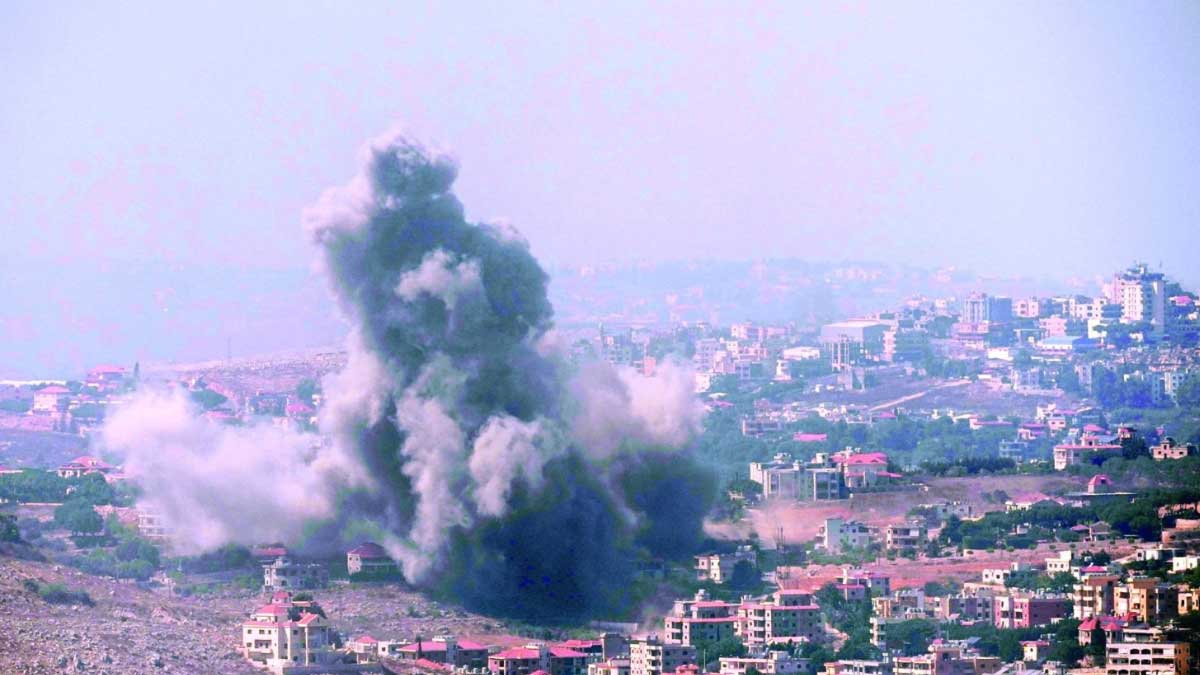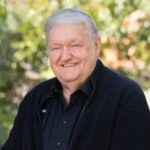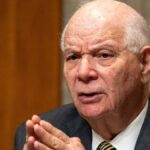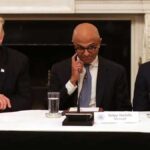- Home
- Billionaires
- Investing Newsletters
- 193CC 1000
- Article Layout 2
- Article Layout 3
- Article Layout 4
- Article Layout 5
- Article Layout 6
- Article Layout 7
- Article Layout 8
- Article Layout 9
- Article Layout 10
- Article Layout 11
- Article Layout 12
- Article Layout 13
- Article Layout 14
- Article Sidebar
- Post Format
- pages
- Archive Layouts
- Post Gallery
- Post Video Background
- Post Review
- Sponsored Post
- Leadership
- Business
- Money
- Small Business
- Innovation
- Shop
Recent Posts
Netanyahu Rejects Cease-Fire, Vows Full Force in Lebanon

In a defiant response to mounting international calls for a cease-fire, Israeli Prime Minister Benjamin Netanyahu announced that Israel will persist in its military campaign in Lebanon. This statement comes amid a backdrop of escalating tensions between Israel and Hezbollah, raising fears that the conflict could escalate into a broader regional war.
On Wednesday, the United States, France, and several key allies issued a statement advocating for an immediate 21-day cease-fire along the Israel-Lebanon border. This urgent appeal for a halt in hostilities followed extensive discussions at the United Nations and was supported by nations including Australia, Canada, the European Union, Germany, Italy, Japan, Saudi Arabia, the United Arab Emirates, the United Kingdom, and Qatar. The joint statement highlighted the “intolerable” situation in the region since last October, expressing concerns over the potential for a broader conflict.
The statement called for a “diplomatic settlement” that would enable civilians on both sides of the border to return home safely. It also indicated hope that a cessation of fighting might facilitate a broader cease-fire in Gaza, providing a glimmer of hope for stability in the region.
In contrast to the diplomatic overtures, Netanyahu’s office released a statement emphasizing that the Prime Minister had yet to formally respond to the U.S.-French proposal. The statement further clarified that Netanyahu has instructed the Israel Defense Forces (IDF) to continue operations with “full force.” His stance reflects a hardline approach amidst pressures for de-escalation. The sentiment was echoed by Bezalel Smotrich, Israel’s finance minister and a leader from the far-right, who was the first government official to outright reject the cease-fire proposal on Thursday.
Opposition leader Yair Lapid urged the government to consider the proposal for a seven-day cease-fire. He argued that such a pause could prevent Hezbollah from regrouping and reorganizing its forces. However, he insisted that any agreement must also include provisions to remove Hezbollah from Israel’s northern border, underscoring the complex political dynamics at play.
Lebanon’s Prime Minister welcomed the cease-fire call, asserting that its success would depend on Israel’s commitment to uphold international resolutions. His remarks indicate a cautious optimism, yet they also highlight the fragility of the situation, particularly given the ongoing hostilities.
The call for a cease-fire has received backing from key international figures, including Jeanine Hennis-Plasschaert, the UN Special Coordinator for Lebanon. She expressed her approval of the cease-fire proposal, stating, “Welcome and applaud the call for an immediate 21-day ceasefire to allow the space for diplomacy to succeed. Counting on the unequivocal support of all to seize this opportunity.” Her remarks reflect a broader consensus among international leaders about the necessity of halting the violence to prevent further escalation.
U.S. officials indicated that the cease-fire agreement would be signed by the Israeli and Lebanese governments, noting that Iran-backed Hezbollah would not be a signatory to the deal. They expressed confidence that Netanyahu’s office would accept the proposal, while Lebanon would likely collaborate with Hezbollah to ensure compliance. This nuanced approach highlights the intricate balance of power in the region, where various actors influence the potential for peace.
The international call for a cease-fire has emerged in response to Israel’s extensive aerial bombardment campaign targeting what it claims are Hezbollah positions in southern Lebanon. This military operation, which began earlier in the week, has already resulted in a significant toll, with Lebanese authorities reporting over 600 deaths as a consequence of the airstrikes. The relentless attacks have also forced tens of thousands of civilians to flee their homes, primarily towards Beirut, exacerbating the humanitarian crisis in the region.
Israeli leaders, including Netanyahu, have framed the military actions as essential to dismantling Hezbollah’s military capabilities and restoring safety to Israeli border towns and cities. They argue that the strikes are necessary to protect Israeli citizens from the threat posed by Hezbollah, a militant group regarded as a significant adversary by Israel.
As the conflict unfolds, Israel has also signaled preparations for a potential ground invasion into Lebanon. This prospect has raised alarms among international authorities, including the U.S. government, which has cautioned Israel against further escalating the conflict. Concerns persist that a wider war could erupt, drawing in multiple nations and destabilizing the region further.
Looking ahead, all eyes will be on Netanyahu as he is scheduled to address the U.N. General Assembly on Friday. His remarks at this international forum could provide further insight into Israel’s strategic intentions and its stance on the evolving conflict with Hezbollah.
The situation remains fluid, with diplomatic efforts continuing alongside military operations. The outcome of these developments could shape not only the immediate future of Israel and Lebanon but also the broader geopolitical landscape in the Middle East. The urgent call for a cease-fire underscores the pressing need for dialogue and negotiation, as the stakes continue to rise amid ongoing violence.
Recent Posts
Categories
- 193cc Digital Assets2
- 5G1
- Aerospace & Defense44
- AI32
- Arts3
- Banking & Insurance11
- Big Data3
- Billionaires224
- Boats & Planes1
- Business306
- Careers13
- Cars & Bikes66
- CEO Network1
- CFO Network17
- CHRO Network1
- CIO Network1
- Cloud10
- CMO Network18
- Commercial Real Estate7
- Consultant1
- Consumer Tech155
- CxO1
- Cybersecurity52
- Dining1
- Diversity, Equity & Inclusion4
- Education7
- Energy8
- Enterprise Tech29
- Events11
- Fintech1
- Food & Drink2
- Franchises1
- Freelance1
- Future Of Work2
- Games135
- GIG1
- Healthcare74
- Hollywood & Entertainment154
- Houses1
- Innovation37
- Investing2
- Investing Newsletters4
- Leadership65
- Lifestyle10
- Manufacturing1
- Markets20
- Media184
- Mobile phone1
- Money13
- Personal Finance2
- Policy543
- Real Estate1
- Research6
- Retail1
- Retirement1
- Small Business1
- SportsMoney22
- Style & Beauty1
- Success Income1
- Taxes2
- Travel10
- Uncategorized6
- Vices1
- Watches & Jewelry2
- world's billionaires194
Related Articles
Alphabet Shares Fall 5% as DOJ Seeks Chrome Sale
Shares of Alphabet, the parent company of Google, dropped more than 5%...
By 193cc Agency CouncilNovember 22, 2024Carr’s FCC Nomination and Musk’s Potential Gains
President-elect Donald Trump has nominated Brendan Carr to lead the Federal Communications...
By 193cc Agency CouncilNovember 19, 2024Musk Joins Trump’s Call with Ukraine’s Zelensky
Billionaire Elon Musk played an unexpected role in a call between President-elect...
By 193cc Agency CouncilNovember 9, 2024Trump’s Day 1 Priorities: Immigration, Energy, Ukraine, Iran
Former President Donald Trump’s advisers revealed that his top priorities for the...
By 193cc Agency CouncilNovember 7, 2024















Leave a comment